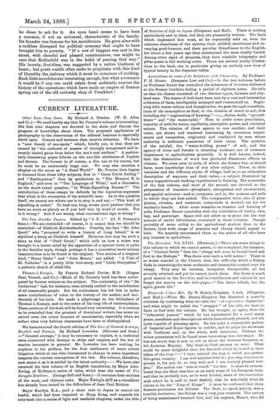Monarchs I have Met. By W. Beatty-Kingston. 2 vols. (Chapman
and Hall.)—When Mr. Beatty-Kingston has disarmed a possible criticism by confessing what he calls the "ad captandum character," and what might be called the " swagger " of his title, we have no fault to find with his volume. He has brought up again, from the "influential journal" which he has represented for a good many years, anecdotes and descriptions which have already pleased, and are quite capable of pleasing again. He has quite a respectable gallery of Imperial and Royal figures to exhibit, and he plays the showman with liveliness and, on the whole, with discretion. Perhaps the minor potentates will be found more interesting than the major. He has not much that is new to tell us about the German Emperor, or his Austrian Majesty. The Shah-in-Shah amuses us more. What could be more delightful than the farewell which be is said to have taken of the Czar ?—" I have noticed the way in which you govern this great country. I am well satisfied with it ; you may continue to govern it, for you do so very well, and I am entirely pleased with you." The author can "almost vouch" for this. It must be remem- bered that the Shah was then at an early stage of his European tour, and that he probably lost, as he went further, more of the conviction with which he is said to have started, that he was really what he claims to be, the "King of Kings." It must be confessed that these Eastern potentates are failures. The Shah, to speak plainly, was a horrible barbarian ; the Sultan was a very poor creature. The terrors of being assassinated haunted him, and his nephew, Murad, who did
actually succeed him (but almost immediately went mad) was the special object of his dread. On one occasion, when in a steamer on the Danube, he was firmly persuaded that he was to be ran down by the vessel that followed, on which Murad happened to be, and the said vessel was strictly ordered to keep its distance. Mr. Beatty- Kingston, by-the-way, has a good account to give of the present Sultan. But surely he is wrong when he says that "he contents himself with one wife-in-chief." The head of the House of Othman is never married. Of other monarchs, Maximilian of Mexico, Prince Casa, a somewhat disreputable Hospodar of Wallachia, Victor Emmanuel, and Ismail Pasha may be mentioned. This last potentate is permitted to give a glowing account of himself and his virtue as a ruler, which our author seems disposed to confirm.. All the same, we have the story of a dinner at which there was a dish costing "fifty pounds a mouthful." Will the illustrious exile be able, by the help of Mr. Marriott, to enjoy this luxury again ? We must not forget to mention the account of the late Pope, who is described as putting the author through an examination into the various forms of English Dissent, in which he was not qualified to shine. This is an enter- taining book which a critic finds a little long because be soon makes up his mind what to say about it, but which will not weary its readers.



































 Previous page
Previous page